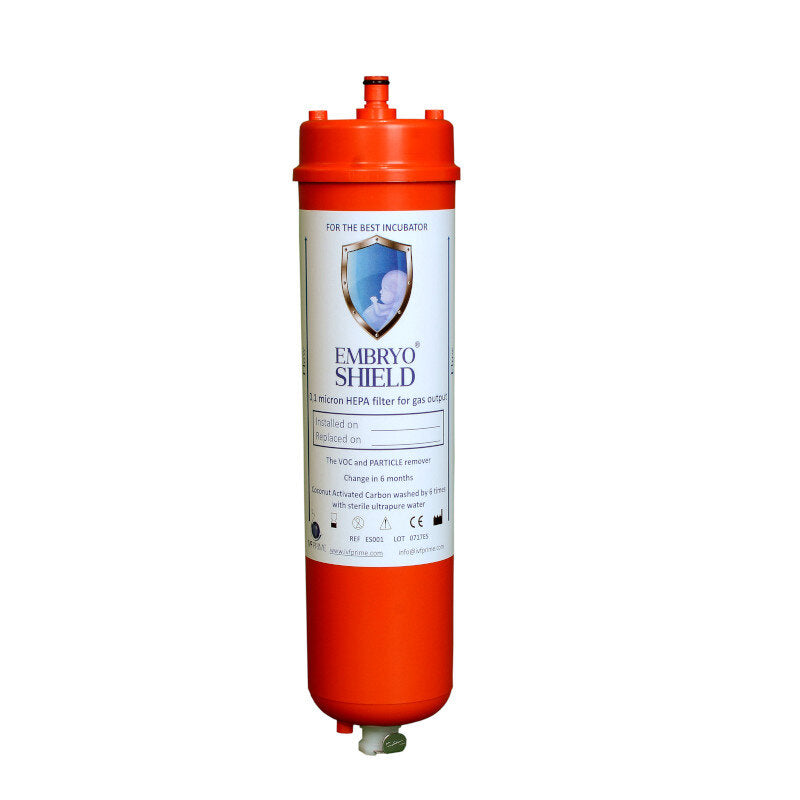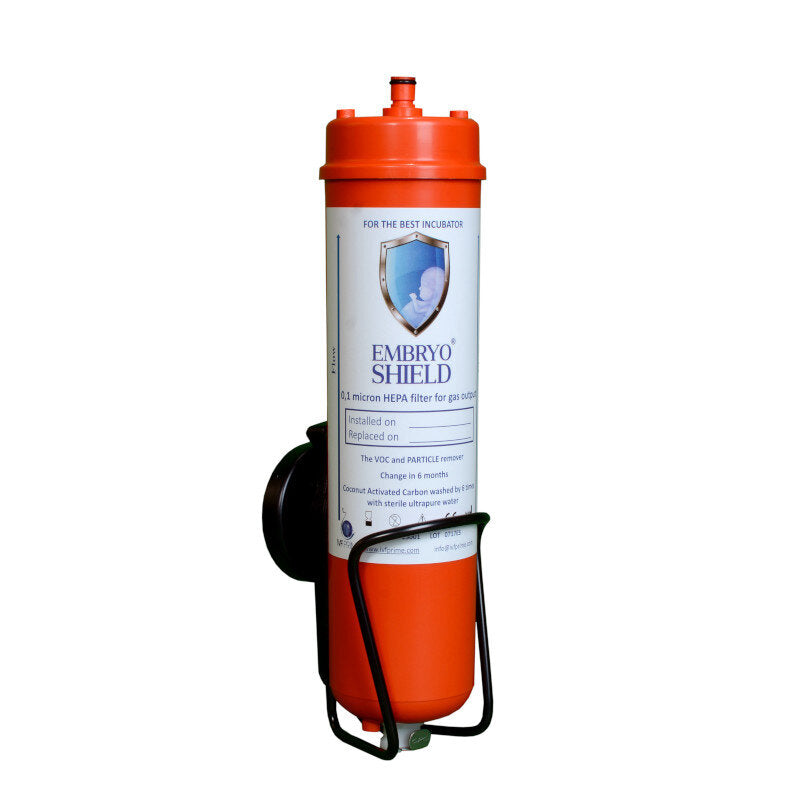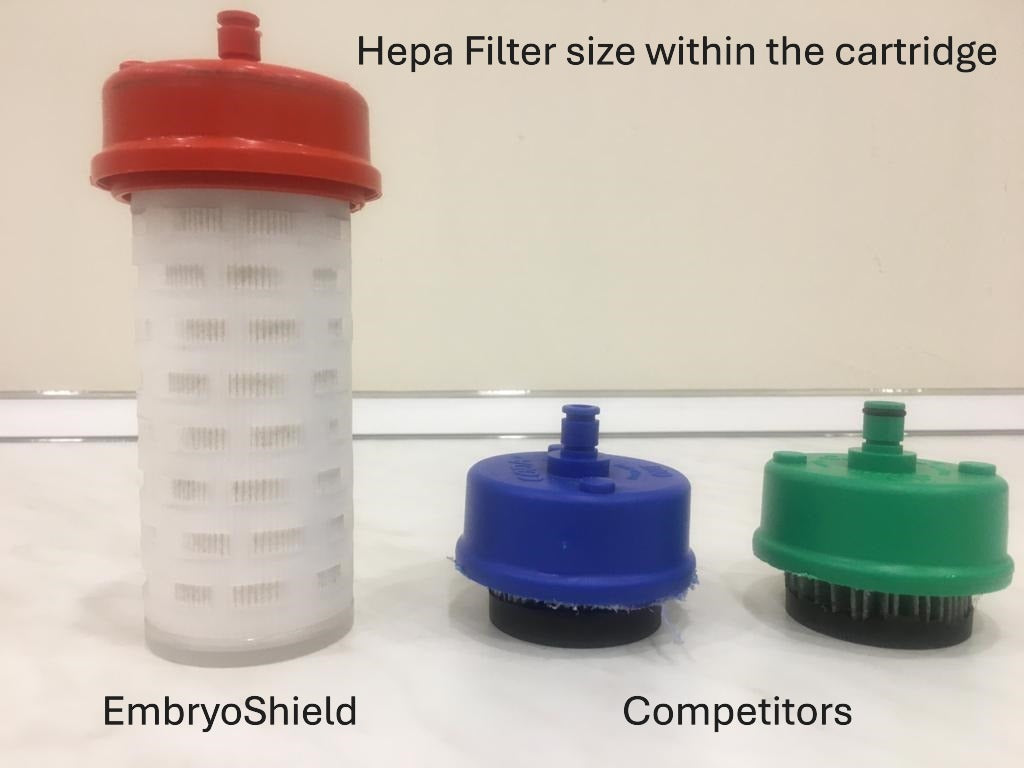EmbryoShield® Gas Inline Filter for IVF
EmbryoShield® Gas Inline Filter for IVF
EmbryoShield: Raising the Standard in Gas Filtration for IVF Laboratories
One of the most critical factors is the purity of the gases used in incubators. EmbryoShield HEPA Inline Filters are designed specifically for IVF laboratories, protecting embryos by removing volatile organic compounds (VOCs), airborne pollutants, dust, and other harmful substances from CO₂ and N₂ gas lines.
Built on years of innovation and rigorous testing, EmbryoShield is proven to improve outcomes, including higher rates of embryos reaching the expanded blastocyst stage.
What Makes Embryo Shield Different
1. Unmatched Filtration Power
- The only inline HEPA filter on the market with a 0.1 µm pore size, crucial for capturing the smallest and most abundant particles.
- A 12 cm Ultra HEPA filter core with three times the surface area of conventional filters, ensuring greater absorption without pore expansion under pressure.
- Independent testing by Nanolab Laboratory Services confirmed a 100% retention rate of aldehydes, demonstrating exceptional purification.
2. Advanced Gas Purification with Coconut Active Carbon
- Uses coconut-based active carbon, with a surface area 20 times larger than standard coal-based carbon.
- Each filter is washed six times with sterile water, increasing absorption capacity by up to 40%.
- A 26 cm casing allows for a larger carbon volume, extending filter life and performance.
3. Proven Quality and Safety
- Every lot is validated with MEA (Mouse Embryo Assay) and pH testing, making EmbryoShield the first and only inline filter on the market with this level of testing.
- Each unit undergoes a pressure test to ensure reliability under working conditions.
- Manufactured in an ISO 13485:2016 certified facility to guarantee consistency and compliance.
- Produced without adhesives or chemicals; the HEPA filter is sealed using spin welding, ensuring strength and safety without silicone or solvents.
4. Designed for Ease and Safety
- A check-valve connector ensures gas flow begins immediately upon connection and stops automatically when disconnected.
- Plug-and-play connectors and ergonomic magnetic holders make installation simple. The HL001 magnet holder attaches securely to incubators or metal surfaces, keeping filters stable during operation.
5. Reliable Replacement Cycle
- To maintain peak performance, filters should be replaced every six months.
- Recommended shelf life from date of manufacture is 5 years
Upgrade Your Laboratory Confidence
EmbryoShield gives IVF laboratories an extra layer of protection, helping embryologists and lab managers safeguard embryo development with confidence.
Frequently Asked Questions (FAQs) about EmbryoShield
Here are some common questions about the EmbryoShield HEPA Inline Filter, designed to provide comprehensive insights into its features, benefits, and usage in IVF laboratories.
What is Embryo Shield and what is its primary function?
EmbryoShield is a HEPA Inline Filter specifically designed for IVF Laboratory Use. Its primary function is to purify CO2 and N2 gases coming from gas lines to incubators by absorbing volatile organic compounds (VOCs), common air pollutants, dust, and all noxious compounds.
How does Embryo Shield contribute to successful embryo development?
It has been proven that using EmbryoShield increases the number of embryos which develop to the expanded blastocyst stage.
What makes the filtration capability of Embryo Shield unique?
EmbryoShield is the only HEPA inline filter in the market with a 0.1µm pore size. This exceptionally small pore size is crucial because a higher number of particles are present in gases as particle size decreases. The Ultra HEPA filter within its casing is 12cm long, providing a surface area that is three times larger than its nearest competitor for superior absorption. Crucially, the 0.1µm pores do not expand even under high pressures within the HEPA filter.
What type of activated carbon does Embryo Shield utilise and why?
EmbryoShield contains Coconut Active Carbon. The absorption rate of Coconut Active Carbon is significantly greater than coal-based activated carbon, and its surface area is an astounding 20 times larger. The Coconut Active Carbon inside EmbryoShield is also meticulously washed 6 times repeatedly with sterile water. This rigorous washing process clears particles within the carbon's pores, offering 40% more absorption capacity.
What are the dimensions of the Embryo Shield filter and how does this affect its performance?
The outer casing of EmbryoShield is 26 cm in length. This generous length is engineered to contain ample Coconut activated carbon, which enables the absorption of more VOC and CAC gases and contributes to a longer useful working life.
What quality assurance and safety standards does Embryo Shield meet?
EmbryoShield undergoes meticulous quality control standards:
- Each lot is MEA (Mouse Embryo Assay) and pH tested, making it the first and only MEA and pH tested inline filter in the market.
- Every unit is subjected to a stringent pressure test to ensure the safety of each product.
- It is manufactured in an ISO 13485:2016 facility, adhering to high quality production standards.
- No adhesives or chemical materials are used in the production process, ensuring safety for medical use. The HEPA filter coupling utilises a spin welding machine, ensuring high-pressure tolerance without the need for silicon or chemicals.
How does Embryo Shield ensure gas flow safety and ease of use?
EmbryoShield is equipped with a connector featuring a check valve. This design means that gas flow starts immediately when the filter is connected to the gas line and automatically stops upon disconnection. It uses a Female-Male connector pair. Furthermore, plug & play connectors and ergonomic magnet holders facilitate an easy connection to the gas line. The HL001 Magnet Holder ensures continuous gas flow and can be securely attached to the edges of an incubator or any metal surface due to its magnetic properties.
How often should Embryo Shield be replaced?
For best results and to maintain peak performance, it is recommended to change EmbryoShield every 6 months.
Has Embryo Shield been tested for aldehyde retention?
Yes, a test conducted by Nanolab Laboratory Services confirmed a 100% aldehyde retention rate for the EmbryoShield gas line filter.
Share






